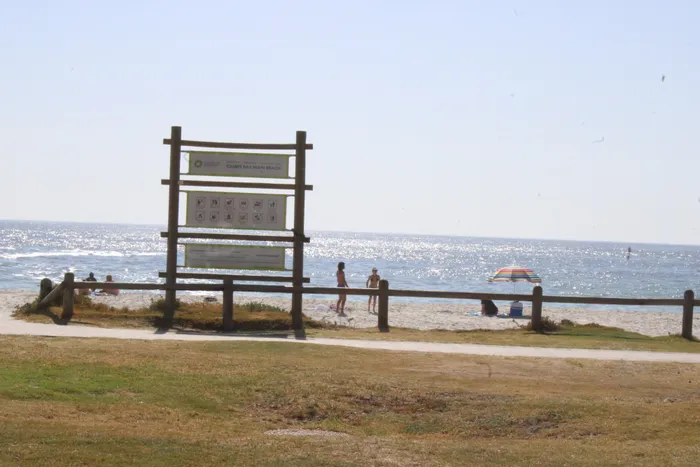Questions over Cape Town’s Blue Flag beaches

Camps Bay Beach is one of eight Cape Town beaches awarded Blue Flag status by the Wildlife and Environment Society of South Africa.
The Wildlife and Environment Society of South Africa (WESSA) has awarded Blue Flag status to eight Cape Town beaches ahead of the tourist season, but some environmental experts say it’s more of a marketing gimmick than a reliable test of water quality.
Bikini Beach, Camps Bay, Clifton 4th Beach, Fish Hoek, Llandudno, Melkbosstrand, Muizenberg, and Silwerstroom have all been given the Blue Flag thumbs-up.
These beaches fall under the Table Mountain National Park Marine Protected Area (MPA) - 1000km² stretch of the sea and coastline from Mouille Point in the north to Muizenberg in the south.
Mayoral committee member for community services and health Patricia van der Ross hailed the Blue Flag announcement as a "welcome boost" and a "wonderful achievement" for Cape Town.
"As we wade deeper into the summer season, our beaches and recreational facilities will be bustling with residents and visitors. A lot of hard work continues behind the scenes to ensure that we are summer ready, and that residents and visitors alike will enjoy our world-class amenities and facilities."
Details of lifeguard deployments and general summer safety plans would be publicised in coming weeks as the City counted down to the start of the festive season, she said.
However, environmentalists have criticised the Blue Flag status given the widespread reports over the years of pollution in waterways and beaches across the city.
Professor Leslie Petrik, group leader of environmental and nano sciences at UWC, said the Blue Flag was a commercial venture and not a scientific verification of beach safety.
“Pollution testing is too infrequent to declare any beach safe. They also only rate for a few months of the year.”
Jean Tresfon, a marine conservation photographer, believes it’s a marketing tool and not an indicator of water quality.
“It's a joke. The testing window is tiny and is only done over a couple of months in the height of summer when the wind is mainly offshore. At Camps Bay, only half the beach has Blue Flag status as there is a sewage pump station on the other half, but they don't tell the public that.”
Ms Van der Ross said the entire Camps Bay Beach had Blue Flag status.
“The pump station is not contrary to standards and is, in fact, critical infrastructure that is reflected on the bathing water profile for the beach,” she said.
However, she added that only a portion of the beach was a designated bathing area.
“This area is demarcated by lifeguards with red and yellow markers and the presence of lifeguards as reflected on the Blue Flag board. The operational times and season of the beach are also visible on the beach Blue Flag board, mounted on the wall at the main ablution block adjacent to the lifeguard tower at Camp’s Bay and at the railing of the beach entrance at Clifton.”
Dr Jo Barnes, the senior lecturer emeritus in the faculty of medicine and health sciences at Stellenbosch University, said any form of oversight of beach and sea safety should be welcomed, but the Blue Flag rating system was more about tourism than water safety.
“There are many aspects counting towards points under the system that have little to do with water safety. Unfortunately, the crucial sampling under the Blue Flag system happens only a few times over a three month summer period and easily misses episodes of sewage contamination, etc. In some cases, the authority directly responsible for poor sanitation (i.e. a municipality) is also directly involved in deciding where and when samples should be taken,” said Dr Barnes.
In a statement, the City said the Blue Flag season would run from December 1 to January 31, 2024 at all of the accredited beaches, except Camps Bay and Muizenberg, where it would be in effect until the end of March 2024.
In the event of sewage pollution at a Blue Flag beach, the blue flag would be lowered, Ms Van der Ross said.
“The Blue Flag is lowered immediately and is kept lowered until the pollution event has been responded to, contained and rectified; subsequent water testing indicates that the pollution event is over; and permission is given to raise the flag; the national operator – WESSA – is informed; the aforementioned Blue Flag board is updated with the details of the pollution event and subsequent water quality results.”
Tevya Lotriet, the senior sustainability programme manager for WESSA, said that by December they hoped to be able to display all water quality results on their website as soon as they received them from the respective municipalities or independent labs.
“Our national jury have recently put together proposed stricter criteria for South African Blue Flag beaches, which will be voluntary for the upcoming season and compulsory for the following season. It will require water quality testing at least every two weeks. That being said, the City of Cape Town already do test much more frequently than monthly,” said Ms Lotriet.
